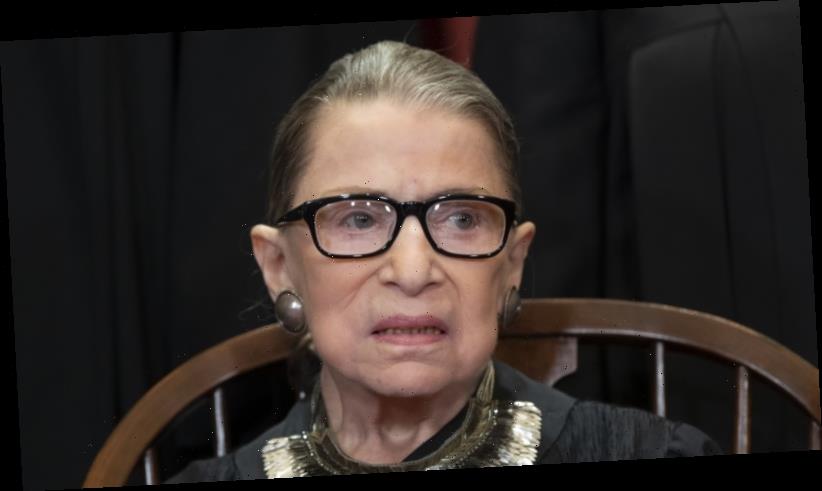Washington: In the fiercely-contested Gore vs Bush election of 2000, there were Florida's notorious "hanging chads": punch-card ballots had not been completely perforated, making it unclear whether they should be counted or thrown away.
The fight over Florida's excruciatingly close result made its way to the US Supreme Court which, 36 days after election day, certified Bush the winner of Florida and, therefore, the presidency.
Among those in the minority of the 5-4 decision was Ruth Bader Ginsburg, who died last week at age 87.
Republicans are moving quickly to fill Supreme Court seat left vacant by Ruth Bader Ginsburg’s death.Credit:AP
In this year's presidential election, the most contentious issue could be "naked ballots" in Pennsylvania, a battleground state that could determine the election outcome. On the same day as Ginsburg's death, Pennsylvania's top court ruled that all postal ballots must be placed inside a special secrecy sleeve as well as the official return envelope. Unlike in previous elections, all ballots returned without the secrecy sleeve will be rejected.
These so-called "naked ballots" could have major consequences given Americans are expected to vote by mail in bigger numbers than ever before because of the coronavirus pandemic. Polls show Democrats are far more likely to vote by mail than Republicans – meaning they have the most to lose if officials reject a substantial number of postal ballots.
Philadelphia city commissioner Lisa Deeley, a Democrat, warned that the court's decision put more than 100,000 postal votes in Pennsylvania at risk, based on past error rates.
In the 2016 election, Donald Trump defeated Hillary Clinton in Pennsylvania by just over 44,000 votes.
In a letter to the Republican leaders of the state Senate and House of Representatives, Deely warned that the court's naked ballot decision could make Pennsylvania the "subject of significant post-election legal controversy, the likes of which we have not seen since Florida in 2000." She asked the legislators to eliminate the secrecy sleeve requirement – a request they quickly rejected.
A stoush over Pennsylvania's "naked ballots" is just one of the possible conflicts that could play out through the courts if the result between Trump and Democratic nominee Joe Biden is close on election night. Each state uses its own particular electoral rules, raising the chances of a variety of different legal challenges across the country.
Trump set off a firestorm on Thursday (AEST) by saying he would not necessarily accept the peaceful transfer of power if he does not accept the election result.
A widely-read article in The Atlantic this week said that Republicans have discussed taking the remarkable step of bypassing the will of the voters in crucial states if they are behind in the count. It is actually the 538 members of the Electoral College – the so-called "electors" – who decide the presidential outcome.
This fact is rarely discussed and even the most plugged-in political insider would be unable to name any of the electors, who are appointed by state party members and officials. That's because, with only rare and usually inconsequential exceptions, the electors cast their ballots in accordance with the election result in their state. But that is not dictated by the US Constitution.
"With a justification based on claims of rampant fraud, Trump would ask state legislators to set aside the popular vote and exercise their power to choose a slate of electors directly," The Atlantic article said.
Heightening the stakes even further is the Supreme Court seat left vacant following Ginsburg's death.
Chief Justice John Roberts has disappointed Republicans with several recent rulings.Credit:AP
When Trump denounced a judge who rejected his asylum seeker policy as an "Obama judge" in 2018, Roberts responded in a rare public comment: "We do not have Obama judges or Trump judges, Bush judges or Clinton judges. What we have is an extraordinary group of dedicated judges doing their level best to do equal right to those appearing before them."
In June this year Roberts sided with the court's four progressive justices and cast the decisive vote to strike down moves to restrict abortion access in Louisiana.
He also joined with the progressives to stop the Trump administration from proceeding with a plan to deport up to 700,000 young immigrants who arrived in the country illegally when they were children. He also ruled that the 1964 Civil Rights Act prohibits workplace discrimination on the basis of sexual orientation or gender identity.
All these decisions disappointed conservatives, who felt Roberts had betrayed them.
With the appointment of a sixth conservative, Roberts' moderating influence as the Supreme Court's crucial swing vote is likely to be diluted. The nightmare scenario Democrats envisaged when Kavanaugh was appointed may not have been averted, merely delayed.
Trump Biden 2020
Our weekly newsletter will deliver expert analysis of the race to the White House from our US correspondent Matthew Knott. Sign up for The Sydney Morning Herald‘s newsletter here, The Age‘s here, Brisbane Times‘ here and WAtoday‘s here.
Most Viewed in World
Source: Read Full Article


